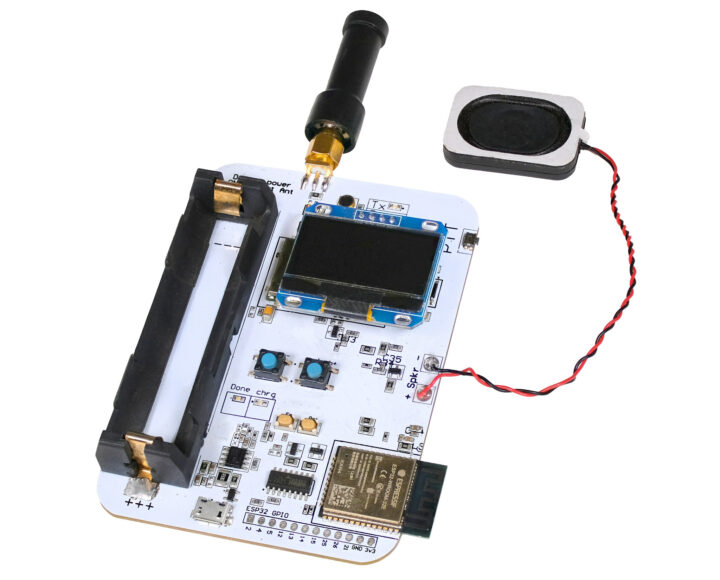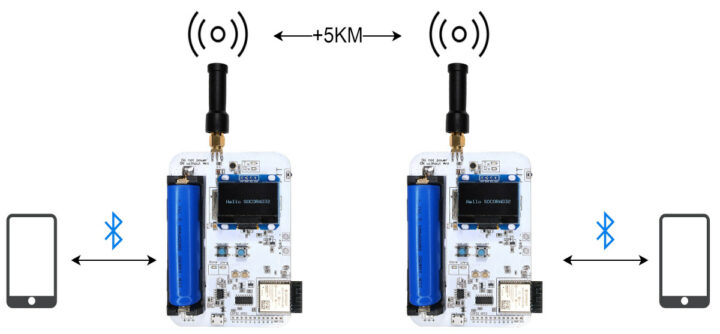SOCORAD32, aka ESP32 Software Controlled Radio, is a hackable, open-source hardware ESP32-based amateur radio board for walkie-talkie and data communication applications.
The board comes with an ESP32 module with WiFi 4 and Bluetooth connectivity, an RDA Microelectronics RDA1846 RF IC used in many commercial walkie-talkies and offering a range up of to 5 km, a small display, a speaker, and a 18650 battery holder.
SOCORAD32 specifications:
- Microcontroller module – ESP32-WROOVER-32E with ESP32 dual-core microcontroller, 4MB flash, 2.4 GHz WiFi and Bluetooth connectivity, built-in PCB antenna
- Walkie-talkie chip – RDA1846 single-chip transceiver for Walkie-Talkie applications (See datasheet and programming guide for details)
- Frequency Range: ISM 400 – 470 MHz
- Frequency Step: 5 K / 6.25 K / 12.5 K / 25 K
- RF Output Power: 2 W / 0.5 W (+5 KM @ 2 W) set to what the local law permits
- RF Input Sensitivity: -122 dBm
- Voice Scrambling: 8 type
- Voice Compression & Expansion
- SMS Exchange: Send and receive SMS (or, for IoT, send and receive data)
- CTCSS (38 group) + CDCSS (83 group)
- Automatic Tail Elimination – Eliminates the squelch burst often heard at the end of transmission as the PTT is released
- Volume: Adjustable speaker output (1-8)
- Squelch level adjustable (0-9)
- MIC sensitivity level adjustable (1-8)
- Sleep mode: 0.1μA
- External antenna
- Display – OLED display
- Audio – Speaker, built-in microphone
- USB – Micro USB port for control, programming, and charging
- Expansion – 12-pin ESP32 I/O header
- Misc – 2x Volume/Channel buttons, Enable and Reset buttons, and 2x LEDs
- Battery – 16850 battery holder
The SOCORAD32 can be controlled through AT commands to configure the audio volume, tone squelching, CTCSS, CDSS codes, and more. Here are some examples:
|
1 |
AT+DMOVOX=X |
To turn on voice-operated exchange (VOX) where X is the sensitivity level (1-8).
|
1 |
AT+DMOVOL=X |
To control speaker volume where X is the loudness level (1-8).
|
1 |
AT+DMOGRP=RFV, TFV, RXCT, TXCT, Flag, Flag1 |
To change communication parameters where RFV = receive frequency, TFV = transmit frequency, RXCT = CTCSS/CDCSS coding, TXCT = CTCSS/CDCSS transmit coding, Flag = busy locking/band setting (narrow or wide), and Flag1 = transmit power settings high (2 W) or low (0.5 W). Example:
|
1 |
AT+DMOGRP=450.02500, 450.02500, 7006, 7006, 0, 0 |
You’ll find the AT command set and some basic code (Arduino sketch to set the ESP32 as a Bluetooth serial device) on GitHub. Besides walkie-talkie applications, the SOCORAD32 board could be used as an Intercom, a Pager, a voice-activated audio monitor, and for long-range IoT applications, as well as amateur radio experimentation.
Made by Mord Technologies in Nigeria, the SOCORAD32 board has just launched on Crowd Supply with a $5,600 funding goal that’s almost reached. There’s a single reward with the SOCORAD32 controller offered with a speaker and an antenna with a pledge of $80 plus $8 for shipping to the US and $18 to the rest of the world. You’d just need a 18650 battery to get started, and you’ll probably want to get two boards although the SOCORAD32 can be programmed to be compatible with commercial walkie-talkies.

Jean-Luc started CNX Software in 2010 as a part-time endeavor, before quitting his job as a software engineering manager, and starting to write daily news, and reviews full time later in 2011.
Support CNX Software! Donate via cryptocurrencies, become a Patron on Patreon, or purchase goods on Amazon or Aliexpress






